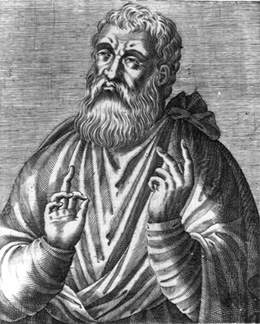|
In our case, murder being once for all forbidden, we may not destroy even the fœtus in the womb, while as yet the human being derives blood from other parts of the body for its sustenance. To hinder a birth is merely a speedier man-killing; nor does it matter whether you take away a life that is born, or destroy one that is coming to the birth. That is a man which is going to be one; you have the fruit already in its seed. |
At this day, among ourselves, blood consecrated to Bellona, blood drawn from a punctured thigh and then partaken of, seals initiation into the rites of that goddess. Those, too, who at the gladiator shows, for the cure of epilepsy, quaff with greedy thirst the blood of criminals slain in the arena, as it flows fresh from the wound, and then rush off — to whom do they belong? Those, also, who make meals on the flesh of wild beasts at the place of combat — who have keen appetites for bear and stag? That bear in the struggle was bedewed with the blood of the man whom it lacerated: that stag rolled itself in the gladiator's gore. The entrails of the very bears, loaded with as yet undigested human viscera, are in great request. And you have men rifting up man-fed flesh? If you partake of food like this, how do your repasts differ from those you accuse us Christians of? |
 “But lest any one think that this is an unreasonable and reckless utterance, we demand that the charges against the Christians be investigated, and that, if these be substantiated, they be punished as they deserve; [or rather, indeed, we ourselves will punish them.] But if no one can convict us of anything, true reason forbids you, for the sake of a wicked rumour, to wrong blameless men, and indeed rather yourselves, who think fit to direct affairs, not by judgment, but by passion.” Chap III
“But lest any one think that this is an unreasonable and reckless utterance, we demand that the charges against the Christians be investigated, and that, if these be substantiated, they be punished as they deserve; [or rather, indeed, we ourselves will punish them.] But if no one can convict us of anything, true reason forbids you, for the sake of a wicked rumour, to wrong blameless men, and indeed rather yourselves, who think fit to direct affairs, not by judgment, but by passion.” Chap III

